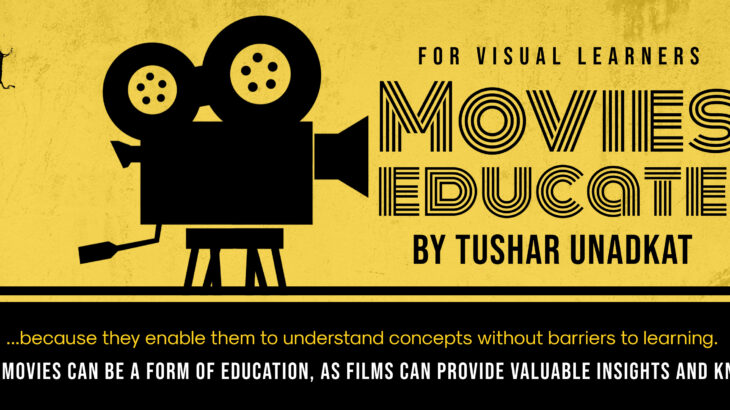Movies are an excellent resource for visual learners because they enable them to understand concepts without barriers to learning. Watching movies can be a form of education, as films can provide valuable insights and knowledge. Movies can be an influential agency for wisdom and help viewers better understand different cultures, historical events, scientific concepts, and social issues. Movies Educate says TusharUnadkat
For instance, a historical movie can be entertaining and informative to learn about a particular period or event. Similarly, a documentary can offer valuable insights and information on various subjects, such as environmental issues, politics, or economics.
One famous quote related to education and films is by the American filmmaker and screenwriter Steven Spielberg: “I think cinema, movies, and magic have always been closely associated. The very earliest people who made film were magicians.”
This quote highlights the idea that movies have the power to captivate and engage audiences and can be an assertive means for education and learning.
It is important to note that while not all movies are educational, some may not provide accurate information. Therefore, it is necessary to critically evaluate the sources of information and do additional research to ensure the accuracy of the data presented in the film.
According to research, watching a movie can save the time one would spend reading a book for a few days only to discover that the book is not good. With a film, however, one can determine whether it is good or bad after only a few hours of viewing it. It is educational and valuable to soak into a new culture and remains visually appealing. Movies are social; surprisingly, watching a movie can relieve stress, like reading a great book.
Most people only view films as entertainment, but this should be different since movies play a significant role in the education system. Unfortunately, many parents with schoolchildren believe that movies are addictive and disruptive in their children’s academic lives. However, teachers use popular educative films because they think they will improve students’ education and bolster their understanding of a particular subject.
Unfortunately, using traditional learning methods alone might only motivate some. Most people prefer entertainment, and finding a better way to incorporate it into education can be more challenging than through inspirational movies and plays. So, let us look at some incredible benefits of incorporating films into teaching.
Movies help people know and appreciate the stated issues. Therefore, we can see the significance of these values and learn to appreciate the different lifestyles people live and whatever they went through to get to where they are now.
Movies can be a valuable source of information and can provide a unique perspective on historical events, cultural practices, and social issues. One can use movies to explore themes, research characters and storylines, and understand different perspectives and worldviews.
However, it is crucial to recognize that movies are a form of media and are subject to bias, manipulation, and inaccuracies. Therefore, one should use them with other information sources and critically examine and evaluate movies for their accuracy, credibility, and relevance.
In summary, movies can be a vital tool for research purposes, but it is essential to use them critically and to supplement them with other sources of information. Movies Educate says TusharUnadkat





